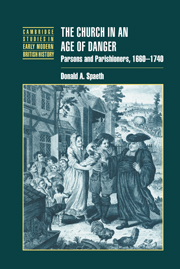Book contents
- Frontmatter
- Contents
- List of tables
- Acknowledgements
- List of abbreviations
- 1 Introduction
- 2 Clerical profiles
- 3 Arenas for conflict
- 4 The management of disputes
- 5 Pastoral care
- 6 Tithes and religious conflict
- 7 The nonconformist threat
- 8 Popular observance
- 9 Matters of life and death
- 10 Singing and religious revival
- 11 Conclusion
- Selected bibliography
- Index
- Cambridge Studies in Early Modern British History
2 - Clerical profiles
Published online by Cambridge University Press: 28 July 2009
- Frontmatter
- Contents
- List of tables
- Acknowledgements
- List of abbreviations
- 1 Introduction
- 2 Clerical profiles
- 3 Arenas for conflict
- 4 The management of disputes
- 5 Pastoral care
- 6 Tithes and religious conflict
- 7 The nonconformist threat
- 8 Popular observance
- 9 Matters of life and death
- 10 Singing and religious revival
- 11 Conclusion
- Selected bibliography
- Index
- Cambridge Studies in Early Modern British History
Summary
The eyes of contemporaries and historians alike have been caught by two clerical stereotypes, the impoverished curate and the wealthy pluralist. Eighteenth-century prints capture these familiar figures. One cartoon portrays a greedy pluralist who is reaching out to hold four churches at once. Another shows a fat incumbent seated comfortably with his tithe profits in a carriage that is being pulled by his lean curates. ‘The Church was made for Me, and not I for the Church,’ the complacent parson observes. One of the harshest critics of the Church and its clergy was Gilbert Burnet, who served as bishop of Salisbury during the crucial period from 1689 to 1715 when the political debate over religion raged most fiercely. Burnet decried the corrupting influence of ‘Covetousness, aspiring to preferments, and a restless seeking after great livings’, which clergymen often sought to hold in plurality. Parsons should ‘watch over and feed their Flock, and not enjoy their Benefices only as Farms, or as Livings’, a word to which he particularly objected. Burnet nevertheless believed that the sharp contrast between wealthy beneficed clerics and starving curates did the Church no good. The ignorance of many clergymen, which was due to the poor quality of education they received from the universities, also contributed to contempt for the clergy.
- Type
- Chapter
- Information
- The Church in an Age of DangerParsons and Parishioners, 1660–1740, pp. 30 - 58Publisher: Cambridge University PressPrint publication year: 2000
- 1
- Cited by



